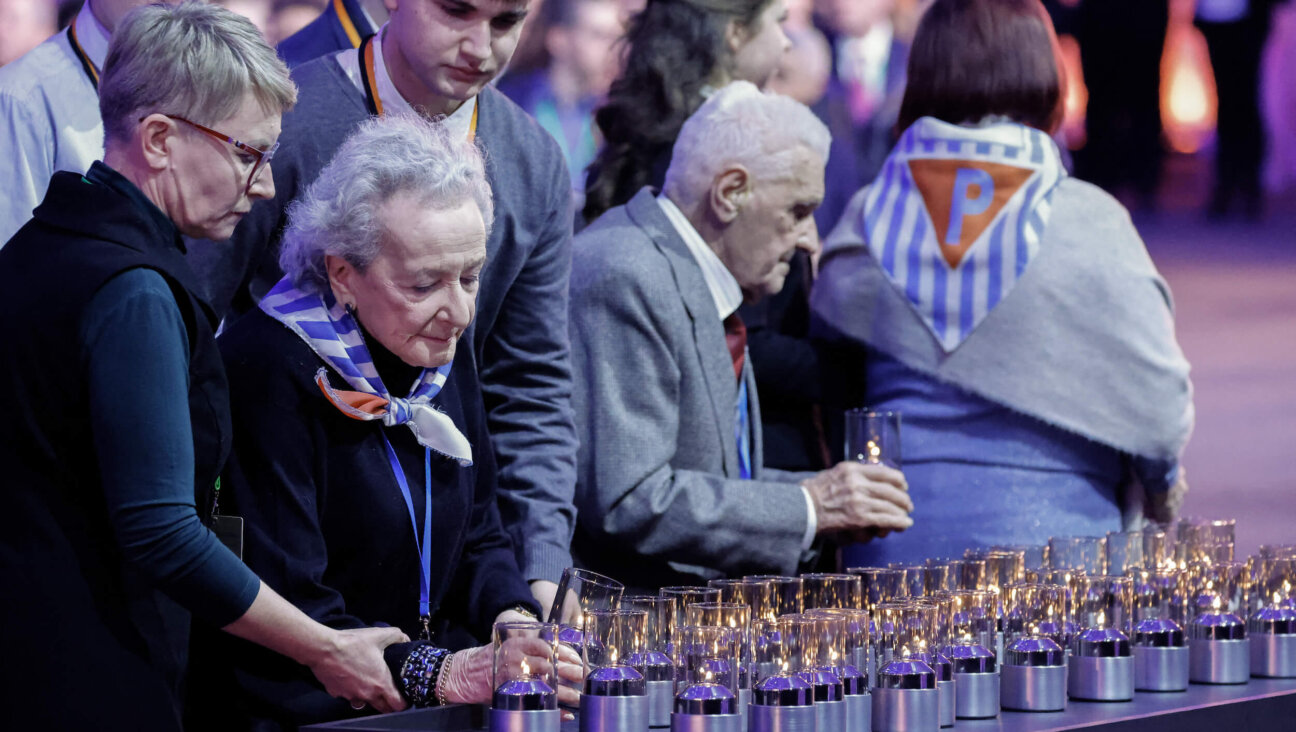Starting 2015 Hungry: The Tenth of Tevet

I don’t recommend fasting on New Year’s Day.
Starvation is not the best cure for a hangover.
But the Jewish calendar isn’t known for convenience, and this year, the Fast of the Tenth of Tevet — Tzom Asara B’Tevet — happened to land on January 1st.
What a joyful way to ring in 2015: revisiting the destruction of the First Temple.
So I fasted last Thursday.
And my “fast-chum” this year, Jeremy, joined me from across the pond in London (he’s English and was visiting his dad), which I told him was kind of cheating because Britain’s daylight is even shorter than ours this time of year and so he suffered less. (We both pitied our brethren in Australia and South Africa, for whom this month includes the longest days of the year.)
Even with the fast’s brevity in New York, I was agitated; not eating is not my forte.
But this obscure holiday did force me to think, in a way I never otherwise would have, about three provocative ideas:
-
Being alert to anti-Semitic rumblings, however quiet they may at first appear.
-
Reanimating ancient tragedies as a way to solemnize recent ones.
-
Turning a minor fast into a major commitment to ameliorate suffering.
The Tenth of Tevet gets no star billing. “Except for fully observant Jews,” said Rabbi Yosef Blau of Yeshiva University, “no one knows anything about it.”
Attempts to inject layers of meaning have met with varying degrees of success, but the holiday’s original importance is straightforward: The Tenth of Tevet (shorthand, 10 Tevet) commemorates the beginning of the siege of Jerusalem by the Babylonians, which culminated in the destruction of the first Temple in 586 BCE.
“And in the ninth year of his reign, on the tenth day of the tenth month, Nebuchadnezzar moved against Jerusalem.” — 2 Kings 25:1–4
There were four stages of the destruction of the Temple: the siege, the breach, the destruction and the assassination of the last Jewish general. We fast for each juncture.
Blau believes there is a powerful lesson in memorializing the starting point, that we should notice the clouds before the storm. “There’s a sense on the Tenth of Tevet that we should always be concerned about what things may lead to instead of waiting for some tragedy to happen. We should be alert to the early stages of the process. The fact that we fast even for the beginning of the destruction, not just for the destruction itself, is probably a reminder that we should be sensitive to dangers even early in the game.”
That said, Blau is quick to stress he’s not a doomsayer: “I’m not an alarmist saying, ‘Anti-Semitism is rising and if we don’t move to Israel next week, it’s all over.’ It’s not because I think Judaism is doomed.”
But Judaism is certainly buffeted, even today. The ugly incidents of anti-Semitic graffiti on American campuses and in London recently, not to mention the murders in Jerusalem, hold portentous, disquieting signs. But they haven’t touched me personally. I don’t experience anti-Semitism in my daily life; I watch it from a distance.
10 Tevet now tugs at my conscience: Don’t dismiss the seemingly benign first insults; they can take root and blossom.
If this holiday reminds us to be attuned to brewing cruelty, it also revisits the worst kind.
On January 11, 1949, the Chief Rabbinate of Israel declared that 10 Tevet would become a day of remembrance for those who died in the Holocaust without anyone to say Kaddish—the mourner’s prayer—for them. It was dubbed Yom HaKaddish HaKleli, translated as “The General Kaddish Day.”
“There was a feeling of, ‘What are we going to do with these yahrzeits for all these people we don’t know?’” explains Rabbi Ethan Tucker, co-founder of Mechon Hadar, an independent seminary in Manhattan. “I don’t know why they picked this fast day as opposed to the others, but I think Asara B’Tevet was a little less burdened with other memory and ritual.”
But the newly declared memoriam didn’t stick. “Two reasons,” Blau explained. One, he says, is Yom HaShoah: that spring day of mourning, created in 1951, two years after Yom HaKaddish, trumped 10 Tevet as the day to honor the 6 million Jews killed in the Holocaust.
It was chosen to coincide with the Warsaw ghetto uprising, which began on April 19, 1943. “We don’t want to just mourn those who died; we want to talk about the Jews who fought back,” Blau said. “That won out.”
The second reason is Tisha B’av — the more well-known fast, which falls in late summer. It has evolved to shoulder most Jewish tragedies, including the Temple destruction and the Holocaust.
Rabbi Ervin Birnbaum, founder and director of Shearim Netanya, the first outreach program to Russian immigrants in Israel, paints a more emotional picture of why the Knesset established Yom HaShoah on April 12, 1951; 10 Tevet was considered insufficient. “It did not satisfy the need of a nation to express its communal horror at a diabolical attempt to liquidate it to the last infirm old and the last newborn infant,” Birnbaum writes.
I’m moved by the debate over how to pay tribute to the un-mourned — the effort to give the ancient siege of Jerusalem an annual immediacy.
Once again, I see how Jewish ritual is the discipline of reconnection — to the past, and to each other. Rabbis are constantly responding to an implicit challenge: Why care about this today? Why observe any of these minor fasts in modern times?
Tucker says it’s not clear that we must. The Talmud, he explains, maintains that the Tenth of Tevet is “actually only obligatory during a time of persecution.”
And who decides whether or when we’re in a time of persecution?
“There’s a lot of disagreement,” Tucker replies. “The rabbis ask, ‘Does that mean each person decides? Each community decides? A Jewish court decides?’”
You mean I could have eaten on New Years Day, had I found a pro-nosh decider who thinks we’re not currently being oppressed?
“As you know,” Tucker says, “If you have two Jews, you’re going to have three opinions.” He sums up the Talmud’s take: If we’re in a time of persecution or suffering—shemad, then fasting is obligatory; if it’s a time of peace, or shalom, fasting is forbidden and these fast days turn into celebrations; it means the messianic time has arrived.
That sounds like an excuse for more New Year’s champagne.
Some ancient rabbis maintained that the building of the Second Temple in 515 BCE meant shalom had arrived and the 10 Tevet fast was moot.
More recent rabbis maintained that shalom arrived in 1948 with the creation of the State of Israel.
Tucker is less concerned with parsing whether we’re in a time of peace or persecution; we’re in a time of need, and these fast days should be about alleviating that condition.
“If you go back to where these fasts are first talked about, in the Book of Zechariah,” Tucker says, “there are two things which are really important: One is that the point of these fast days is not to do some religious act of piety which God needs, but to actually motivate people by turning their attention to be politically and socially active — to make sure the oppressed and the weak in society are not oppressed and are not weak.”
While the Yom Kippur fast demands a focus on ourselves, Tucker says 10 Tevet should prompt a focus on others: “These fast days are not about, ‘How do I become a better person?’ I think they’re about the question ‘Why are you eating? There is so much work to be done in the world. How could you possibly just take the time to take care of yourself?’”
That might smack of a guilt trip, but I take Tucker’s challenge seriously. Not only does it seem Jewishly self-evident, but it also sounds urgent: Our tradition doesn’t care about whether you eat, but about what you do. So what am I doing?
That question distracts me from my self-deprivation on January 1st; I’m focused less on the sandwich I can’t touch, and more on the good deed I’d better complete before sundown.
We all know Judaism says that the noblest gestures are made without recognition, so I will keep mine to myself. But whether or not I decide to fast in the future, I am resolved, from here on in, to at least do something concrete for others on this unheralded holiday — every year, whenever it falls.
My fasting chum, Jeremy, told me that he broke his fast at a London soccer game, watching his team, Tottenham Hotspur. Its base of Jewish fans are the self-declared “Yiddos” in their chants and songs. Perhaps that, too, is a takeaway from this holiday, when an epithet of persecution can be turned on its head and worn with pride.
“I think what the fast day is really focused on,” Rabbi Tucker says, “is, how do you get someone to not focus on their own needs but to focus on the needs of the other, the condition of the Jewish people, and to focus on increasing God’s presence in the world? And if you’re really focused on that, there’s not a lot of time for lunch.”
A message from our Publisher & CEO Rachel Fishman Feddersen

I hope you appreciated this article. Before you go, I’d like to ask you to please support the Forward’s award-winning, nonprofit journalism so that we can be prepared for whatever news 2025 brings.
At a time when other newsrooms are closing or cutting back, the Forward has removed its paywall and invested additional resources to report on the ground from Israel and around the U.S. on the impact of the war, rising antisemitism and polarized discourse.
Readers like you make it all possible. Support our work by becoming a Forward Member and connect with our journalism and your community.
— Rachel Fishman Feddersen, Publisher and CEO























